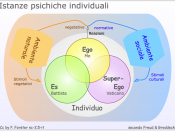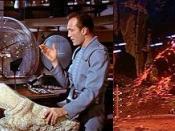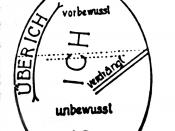This essay will describe and critically review Freud's theory of the development of the super-ego, drawing on the views of Klein, Jung and Winnicott.
The super-ego is the part of the ego that 'functions as a judge or censor of the ego leading eventually to conscience, self-observation and the forming of ideals', (Samuels 1985, p.60). Although Freud (1923) first named the super-ego as a concept in, The Ego and the Id, he had previously explored the idea before naming it as the super-ego. For example, as Anderson (1997, p.152) pointed out, when he spoke of repression as being a force or a censor preventing unacceptable unconscious ideas from becoming conscious. In his paper, On Narcissism, Freud (1914) said that when a child becomes aware of his own critical judgement he seeks perfection from the outside world in the form of an ego ideal. Subsequently, Freud (1917, p.257)
stated that in melancholia when the ego 'rages against itself' conflict takes place between one part of the ego and the critical part of the ego.
Freud (1923) referred to the ego ideal as the super-ego in the presentation of his 'structural model', where he proposed that the mind is composed of the id, the ego and the super-ego. The id, being present from birth, is our unconscious drives, and is dominated by the 'pleasure principle.' Whilst the ego is concerned with reason and common sense, the 'reality principle,'(1923, pp. 363-364).
As the infant develops, and interacts with the external world a portion of the id develops into the ego, (Freud 1923, p.363). The super-ego develops last and is 'a differentiation within the ego', (1923, p.367). Freud saw the super-ego (ego ideal) as being 'the heir of the Oedipus complex' (1923, p.376), as it develops when the child...


